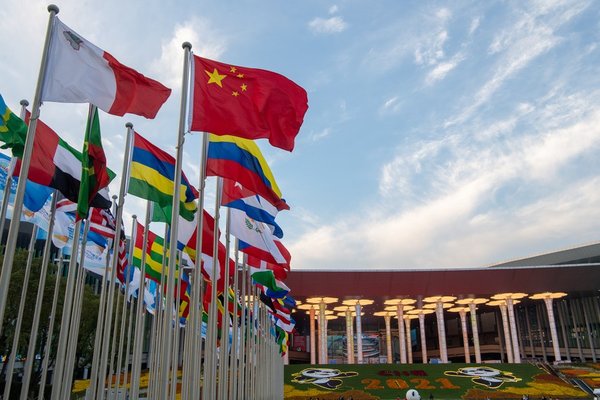Xiconomics: China's Vision on Economic Governance Inspiration for Global Development
 |
| A general view shows the city's skyline in Shanghai, east China, Nov. 2, 2018. [Xinhua/Wang Jianhua] |
BEIJING, March 24 (Xinhua) — How to best handle the relationship between the "visible hand" of the government and the "invisible hand" of the market is a challenge facing policymakers in China and beyond.
When the "invisible hand" fails to move the economy forward, as observed in some Western countries, China has adopted a "two-hands" approach to drive growth.
The economic philosophy of Chinese President Xi Jinping, widely known as "Xiconomics," emphasizes the market's decisive role in allocating resources; at the same time, Xiconomics allows the government to perform its functions better.
Guided by Xiconomics, China has promoted the sound interaction between an efficient market and a capable government, offering inspiration to economies worldwide struggling to improve governance.
 |
| Photo taken on Nov. 9, 2021 shows a view of the south square of the National Exhibition and Convention Center (Shanghai), the main venue for the 4th China International Import Expo (CIIE), in east China's Shanghai. [Xinhua/Wu Huiwo] |
'The Invisible Hand'
When chairing a symposium with entrepreneurs on July 21, 2020, Xi urged efforts to spur the vitality of market entities and promote entrepreneurship and called for more efforts to enable enterprises to play a bigger role and achieve greater development.
Under the guidance of Xi's economic philosophy, China's business environment has continued to improve, and the country has become an increasingly popular global investment destination.
In 2021, China's actual use of foreign capital exceeded 1.1 trillion yuan (about 173.31 billion U.S. dollars), a year-on-year increase of 14.9 percent. High-tech industries and the service sector saw inflows of foreign direct investment jump 17.1 percent and 16.7 percent, respectively, from a year earlier.
Bambang Suryono, chairman of the Indonesian think tank Asia Innovation Study Center, said policy support and other advantages make China the world's most suitable country for innovative business investments and development, which offers inspiration to other developing countries.
From advancing the construction of 21 pilot free trade zones and implementing the Foreign Investment Law, to shortening the negative list for foreign investment and facilitating the entry into force of the Regional Comprehensive Economic Partnership, China has laid out favorable policies to make its market more promising.
Mao Xuxin, principal economist at the National Institute of Economic and Social Research, a London-based economic think tank, said China has provided a favorable investment environment by adopting market opening-up measures.
The open, inclusive and diversified Chinese market will further increase its attractiveness to foreign investment, said Mao.
 |
| Women work at a poverty relief workshop of a relocation site in Fugong County of Lisu Autonomous Prefecture of Nujiang, southwest China's Yunnan Province, Nov. 2, 2020. [Xinhua/Hu Chao] |
'The Visible Hand'
Over the past few decades, some Western countries have failed to strike a balance between the functions of the government and the role of the market and slipped into economic and financial crises that dragged down the global economy.
Xi's insights offer some clues on how economies could allow the "visible hand" to perform its functions better.
"To ensure that the government better performs its functions, we should transform government functions, further the reform of the administrative system, use new administrative methods, improve the macro-control system and enhance the monitoring of market activities," the Chinese president said at a collective study of the Political Bureau of the Communist Party of China Central Committee in 2014.
"We should strengthen and improve public services, and promote social fairness, justice and stability, as well as common prosperity," Xi added.
China has been stepping up efforts to push forward supply-side structural reforms; carry out fiscal, taxation and financial reforms; enhance property rights protection; and improve anti-monopoly regulations.
With such measures, the country has continuously promoted the high-quality development of its socialist market economy, which creates a sound environment for businesses and effectively prevents disorder and failure of the market.
As observed by Director of Brazil's Lula Institute Marcio Pochmann, China leads economic development through national planning and policy commitments.
In 2020, the global population in extreme poverty grew for the first time in more than 20 years as disruptions from the COVID-19 pandemic compounded the impact of climate disasters.
However, in the same year, China met the poverty reduction target set by the United Nations 2030 Agenda for Sustainable Development 10 years ahead of schedule.
For a developing country with a large population and a vast territory, the ability to overcome various impacts and difficulties in a limited period and accomplish the goal of eliminating absolute poverty on schedule is ultimately due to having a government that governs efficiently, Suryono in Indonesia said.
 |
| Robotic arms assemble engines on an assembly line at a workshop of the Weichai Power Co., Ltd. in Weifang City, east China's Shandong Province, April 22, 2021. [Xinhua/Guo Xulei] |
The Chinese Inspiration
In 2020, China was the only major economy that registered positive growth, with its gross domestic product crossing the 100-trillion-yuan (about 15.75 trillion dollars) threshold. In 2021, China's economic growth rate continued to rank among the top of the world's major economies.
As the Chinese president has expounded, a key factor for the great success of China's economic development is the skilled fusion of both market economy strengths with the advantages of a socialist system.
According to overseas observers, despite the uncertainty troubling the global economy, China's economy has been growing steadily because China gives full play to the strengths of its socialist system and allows the "invisible hand" and the "visible hand" to play their respective roles to energize growth.
Unlike the economics of the West that places one-sided emphasis on market mechanisms, Xi's economic philosophy is based on China's national conditions and has greatly enriched the Marxist political economy, said Yu Hong, senior research fellow at the East Asian Institute of the National University of Singapore, adding that the governance wisdom it contains is globally inspiring.
China's economic practices have withstood the fallout from the pandemic. The country has successfully contained the pandemic and maintained production simultaneously, demonstrating the advantages of its system and the effectiveness of its governance.
China's experience has proved that in a socialist market economy, it is possible to coordinate the efficiency of economic development and social governance, which is needed for global economic recovery in the post-pandemic era, said Alexander Petrov, a professor of St. Petersburg State University.
By integrating the basic socialist economic system with the market economy, China has created a synergy between the "invisible hand" and the "visible hand." China's unique economic philosophy and practice have broadened humanity's understanding of economic laws and offered guidance for countries worldwide to bolster sustainable growth.
(Source: Xinhua)
Please understand that womenofchina.cn,a non-profit, information-communication website, cannot reach every writer before using articles and images. For copyright issues, please contact us by emailing: website@womenofchina.cn. The articles published and opinions expressed on this website represent the opinions of writers and are not necessarily shared by womenofchina.cn.






.jpg)

 WeChat
WeChat Weibo
Weibo 京公网安备 11010102004314号
京公网安备 11010102004314号